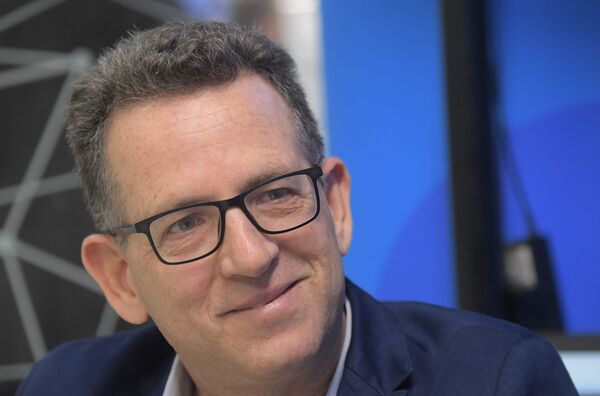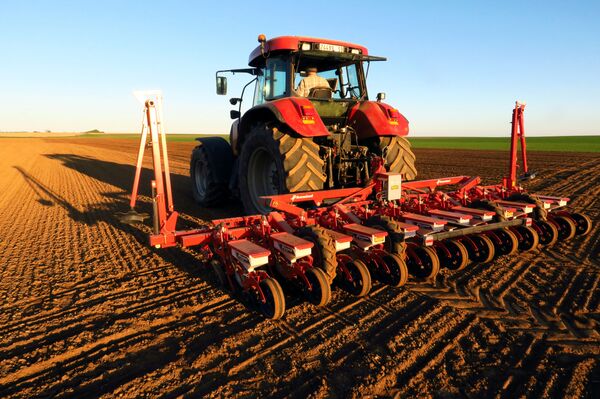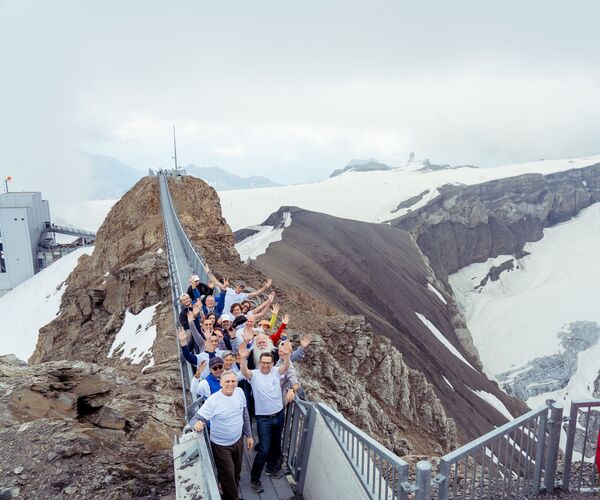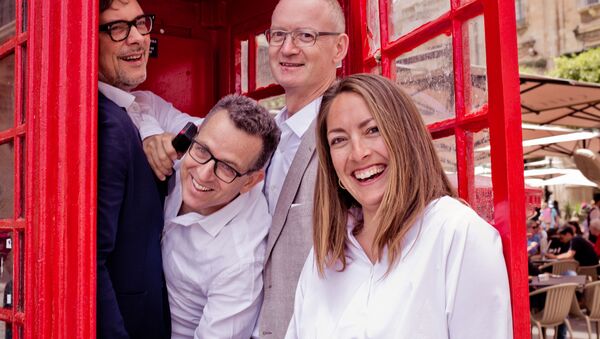Nadav Berge, Founder and Managing Partner of PeakBridge, who was present at the forum, shared his vision of foodtech market development.
Sputnik: You moved into FoodTech 13 years ago. How has this market developed through the years?
Nadav Berger: 13 years ago there was not really foodtech; I grew up in the food industry, I’m the third generation in the food industry. We were producing food for three generations, big operations, 150 million […] but it has always been more of the same. The food industry actually makes the same thing all the time, better meals, low costs, but it’s the same food all the time. 13 years ago I co-founded a company named FoodLab, and it’s an application lab; we have a lot of equipment and very smart people, excluding myself, and we develop new products.

Of the products we launched globally, we have at least one company which became a unicorn; it was just sold to Mars for 3 billion, and this is the Kind bar. A Kind bar is a whole nut bar in the US; it’s very successful. So, we developed a prototype, and we did the scale-up; we went to factories and we produced it. And actually we got $100 thousand for that, and we were so happy, and we were so naïve because this became a company of 3 billion. But this gave me a very good lesson: as I saw that we were creating new brands and amazing innovations, I decided to do a fund that could invest in new companies and technologies; and I did my first fund in Israel six years ago.
Sputnik: Is investing in startups and new technologies profitable?
Nadav Berger: I believe that there should be an investor that knows your domain. We are not regular investors; we have money to invest, but we are all food people. So actually we know what to do for startups to help them to open doors, to start to sell, to bring more investors, to help them in any manner so they can succeed. For me, it’s not very risky because once we invest in something, we pretty much know what we can bring to the table and how we can help them. And also if you look at the big problems of the world, you can find the right products, solutions and technologies so this becomes less risky. For example, one of the big problems of the world is sugar. The problem is that industry puts sugar in all our food, even in your bread there’s sugar. And this is crazy. Why do they add sugar? Because of two things. Firstly, it’s addictive; if you buy bread with sugar, you want more bread, so they can sell more. And the second thing is that sugar is so cheap that it’s a filler. So, if you sell bread by the kilo, you can add some sugar and it’ll weigh more. Sugar is a very cheap filler. But ten percent of the Western world has diabetes; and ten percent more has pre-diabetes, which means 99% diabetes. So, we’re talking about 20 percent of the Western world with diabetes in a few years. This is crazy. These are European statistics: the US, the UK. But here’s the problem: how can you take out sugar? Let’s take kids, for example. They like cereal for breakfast, which is crazy but they like it. So, they buy Frosties. So, if I’m Kellogg's, the largest cereal company in the world, I can say that I can take half of the sugar out and it’s healthier for you; would you buy it? No, because it has a different flavour and it’s not tasty anymore, because you’re used to the taste that you’re used to.

We invested in one company that actually I think will have the solution for that. They said that we should lower sugar by using sugar. This is quite challenging. What they did is – and I’m talking about 21 patents already – they took a natural mineral and they put it with a regular sugar, and they created a different structure of the sugar particles. When it hits your receptors, when it hits your tongue, it stays longer and you thing that you consume a lot of sugar; it’s just sugar that lasts longer on your tongue, but it’s sugar. So, now I can prepare for you the same cereals, you couldn’t tell the difference. They have a very nice collaboration with Ferrero, an amazing company from Italy; they produce Nutella. 40% of Nutella is sugar; I can use this sugar and take 50% of the sugar out, but only if you can’t tell the difference. After a long time, we’ll have Nutella with the same flavour profile, where you can’t tell the difference, with 50% less sugar; but it still has sugar. And this is why that is a brilliant solution, because when you have a product, you don’t need to change the labels. It had sugar, and now it has sugar; and it’s the same sugar, but it’s half the amount. This company for me is still very young; we invested when it was a single digit, below 10 million dollars, and now they just raised 22 million at 56-78, about 80 million in value before they even started to sell. So, we can make money. But why can we make money? We can make money because there’s smart IP technology that solves a huge problem. This is how you should look at it.
Sputnik: Could you name the 3-5 top trends in FoodTech nowadays? What do you invest the most in?
Nadav Berger: I think that the most harming industry to planet Earth is the meat industry. So, meat alternatives. When you have the steak, it was produced by the most inefficient factory in nature; because this factory, which we call cow, needs 7 thousand kilos of grains and 40 thousand litres of water to produce one kilo of the steak. So, to produce three of your steaks we have to use 7 thousand kilos, 7 tonnes of grains, and 40 thousand liters of water. The problem is that we grow 1.5 billion cows on planet Earth, only for meat. So, if you take the numbers that I’ve just mentioned, and you multiply it by 1.5 billion, you can easily see that there are no resources on planet Earth anymore. So, I figured that the most interesting thing that I would look at is meat alternatives; and there’re hundreds of companies now. Another topic that I like – I don’t like the problem, but I like the solutions – is food waste. 40% of what we grow and produce is being thrown away – at the field, at the supermarket, at your home.

Think about it, we use so much energy, labour and ingredients to produce 40% of the food which is thrown away. Another topic that I, of course, like, I mean I would invest it, is sugar reduction or salt reduction. And another topic to invest in is actually restotech, and restotech is bringing new technologies into the restaurant business. How often do you cook at home? Do you cook every day? So, you consume most of your food out of home, in a canteen or café or a restaurant. We are consuming less and less food at home and more and more out of home. For example, in the US, 53% of the food is out of home; it’s not a product that you buy at a supermarket and cook, on average. New York will be 90%, mid-US will be the opposite; but on average 53% is consumed out of home. And it’s growing twice as fast as the regular food. So, out of home grows, retail goes down or grows very slightly. And this industry is not really technology advanced; it’s the same restaurants that are using sale sheets they order from suppliers with a phone and emails, they waste a lot. There’s a lot to fix there.
Sputnik: You cooperate with a large number of countries. Could you give us a small statistical overview and tell which countries have the most developed infrastructure in the FoodTech industry? What is the origin of most FoodTech startups?
Nadav Berger: The most currently successful and innovative hubs for FoodTech would be California and Israel. Actually I've heard a couple of people calling Israel the Silicon Valley of FoodTech. And it’s not because Israel has a really [big] food industry, it’s a very small country and the food industry is very limited. But what Israel has is tech and entrepreneurs. So, the entrepreneurs did software, robotics, they did cyber; and then they said: “how can we save the world?” FoodTech, because everybody consumes food. So, many entrepreneurs moved into the FoodTech scene not because they come from the food industry like myself or the Israeli factories and restaurants, they look at this as an opportunity to make a big change and take it globally.
Sputnik: PeakBridge is a member of the EIT Food Consortium along with companies like Nestle, Danone and others; it has a budget of $1.6 billion to promote innovation in Europe over the next seven years. What are PeakBridge's goals for the next seven years in this regard? What will the company’s budget be spent on?
Nadav Berger: PeakBridge is the fund manager, we invest. So we would like to invest as much as we can, so it’s not about budget. The more we have to invest, the more we will invest. But we want to invest in companies that will make a change. The EIT is an exciting opportunity, because the EIT is a public private initiative. So, the money comes from the EU, a fourth, and then three fourths come from private companies and academia. The total budget, as you said, is 1.6 billion, but in the consortia we have now 55 members, we have Nestle, PepsiCo, Danone, Barilla, and the top academia as well. We have amazing academia and companies that gathered in creating innovation in food in Europe. And to your question, they have four different pillars or activities: education, teaching people or helping people to get to know how to get better nutrition – and they start with kids, for kids to be aware of what they eat – innovation, collaboration and business creation. We are part of the business creation. But in general the goal is to help Europe to eat better and to promote startups that can change European market consumption. Let me go back to the example I gave you. The sugar reduction company that we invested in is a member in the club of the EIT food; EIT food has a club of startups, and if you are a member of this club, you can approach a couple of partners and you can make projects with them, and this will be fully-funded. So, they can get money to do a project with, let’s say, Nestle. And this specific company named DouxMatok has signed a joint venture with Südzucker, the largest producer of sugar in Europe. It’s German and it produces 60% of sugar in Europe. Südzucker is starting to sell the sugars of this company; and Südzucker thinks that they will sell at least 10% of the sugars in Europe with this solution. 10% of the sugars in Europe will be DouxMatok sugars. This is crazy because DouxMatok allows you to reduce sugar by 50%; so if 10% of all the sugars in Europe are DouxMatok, you can actually reduce the consumption in Europe by 5%. Look at it, a tech company comes to a horrible industry, sugar, and with new technology it can reduce the size of the market by 5%. It’s amazing. Think about a startup that can reduce the consumption all over Europe by 5%. So, FoodTech is cool.
Sputnik: PeakBridge is uniquely positioned to be a leading investor in global FoodTech. What key drivers of company’s success can you name?
Nadav Berger: I believe that a great entrepreneur should do two things – and you’ll be surprised. I will invest in you if you have a FoodTech startup only if you can do two things. Firstly, if you can raise money; the most important thing for the CEO of a startup is the ability to raise money, because if you cannot raise money, it’s dead. You can have the amazing technology, an amazing team, great branding, but if your company doesn’t have money, it’s a big problem. And the second thing is entrepreneurs that can do the networking. So, it has to be someone that can go and speak to people, and spread the rumour, and tell about their startup, and socialise. If the CEO is someone that will go into a room and stay quiet in the corner and doesn’t talk to anyone, I’m not sure that they can be a great CEO.



